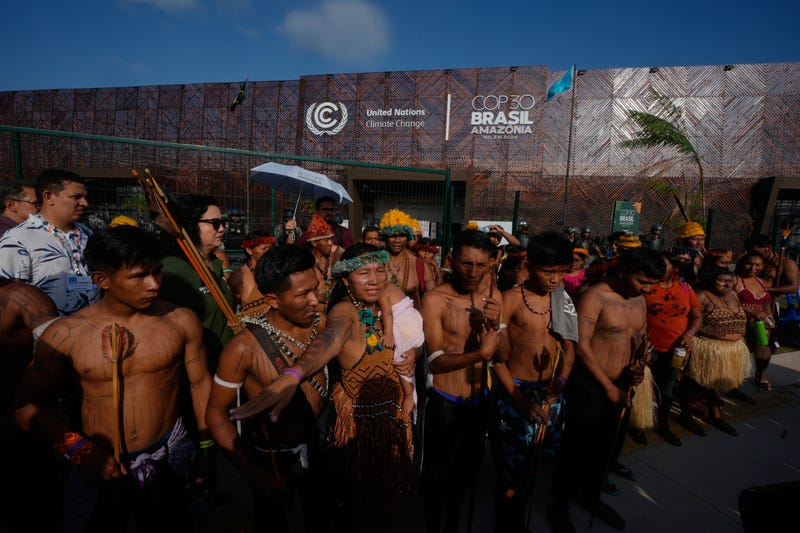
BELEM, Brazil (AP) — Brazil set out to host this year's United Nations climate talks with a promise to spotlight Indigenous peoples whose way of life depends on the Amazon rainforest. Those groups are seizing the chance.
For the second time this week, Indigenous protesters on Friday disrupted entry to the main venue for COP30 to demand progress on climate change and other issues. Though their march was peaceful — it required conference participants to detour through a side door, leading to long lines to get in for the day's events — one protester likened it to “a scream” over rights violated and decisions made without consulting the Indigenous.
“I wish that warmth would melt the coldness of people," Cris Julião Pankararu, of the Pankararu people in the Caatinga biome of Brazil, said.
Brazilian military personnel kept demonstrators from entering the site. The protesters, most in traditional Indigenous garb, formed a human chain around the entrance to keep people from getting in. Other groups of activists formed a secondary chain around them.
Paolo Destilo, with the environmental group Debt for Climate, joined the human chain encircling the protesters, saying he wanted to give Indigenous communities a chance to have their voices heard.
“This is worth any delays to the conference,” he said, adding: “If this is really to be Indigenous peoples’ COP, like officials keep saying, these types of demonstrations should be welcomed at COP30.”
The two-week conference began Monday with countries offering updated national plans to fight climate change. Scientists say it appears likely the world will blow past a goal set in the 2015 Paris Agreement to hold Earth's warming to 1.5 degrees Celsius (2.7 Fahrenheit) since pre-industrial times.
What protesters asked for
Members of the Munduruku Indigenous group led the demonstration that blocked the main entrance, demanding a meeting with Brazilian President Luiz Inácio Lula da Silva.
“President Lula, we are here in front of COP because we want you to listen to us. We refuse to be sacrificed for agribusiness,'' protesters said in a written statement in Portuguese released by the Munduruku Ipereg Ayu Movement. "Our forest is not for sale. We are the ones who protect the climate, and the Amazon cannot continue to be destroyed to enrich large corporations.”
Munduruku leaders had a series of demands for Brazil. They included revoking plans for commercial development of rivers, canceling a grain railway project that has raised fears of deforestation and clearer demarcations of Indigenous territories. They also want a rejection of deforestation carbon credits.
Conference president André Corrêa do Lago, a veteran Brazilian diplomat, met with the group as they blocked the entrance. He cradled a protester's baby in his arms as he talked, smiling and nodding. After a prolonged discussion, do Lago and the protesters moved away from the entrance together. The entrance opened at 9:37 a.m.
The United Nations Framework Convention on Climate Change told conference participants “there is no danger” from what they called a peaceful demonstration.
‘We are listening’
Conference CEO Ana Toni said at a news conference that Belem is the most inclusive COP for Indigenous people with more than 900 Indigenous people registered, far exceeding the old record of 30.
And she said they are being heard.
“We are listening to their voices,” she said. “The reason for having a COP in the Amazon is for us to listen to the very people that are the most vulnerable.”
Harjeet Singh, a veteran activist against the fossil fuels that are driving Earth's dangerous warming, said the protest reflects frustration that past COPs “have not delivered.”
"We should look at this as a message and signal from Indigenous people, who have not seen any progress over the past 33 years of COP, that all these conversations have not led to actions,” Singh said. “They are the custodians of biodiversity and climate and clearly, they are not satisfied with how this process is doing.”
Warnings about ‘tipping point’ from extraction in Amazon
Separately, Indigenous leaders from across the Ecuadorian Amazon used a COP30 side event in Belem to warn that oil drilling, mining and agribusiness expansion are pushing the rainforest closer to an irreversible tipping point.
The session, hosted by Amazon Watch and Indigenous leaders from Kichwa and other nations, focused on the rollback of environmental and Indigenous protections, fossil-fuel contamination along the Napo and Amazon rivers, and demands for direct climate finance for Indigenous communities. Speakers also raised alarm about political decisions in Ecuador, including an upcoming referendum that Indigenous groups fear could weaken constitutional “rights of nature” and collective Indigenous rights.
Leonardo Cerda, a Kichwa leader from Napo, said Indigenous leaders traveled more than 3,000 kilometers along the Napo and Amazon rivers to reach COP30.
“It is very important for us that the rights of Indigenous peoples are recognized at the COP30 negotiating tables, because many times decisions made here directly affect our territory,” he said. “During our journey along the Napo and Amazon rivers, we were able to see how the fossil fuel industry has threatened an ecosystem as fragile as the Amazon and the peoples who live in it.”
___
Associated Press writer Steven Grattan contributed from Bogota, Colombia.
___ The Associated Press’ climate and environmental coverage receives financial support from multiple private foundations. AP is solely responsible for all content. Find AP’s standards for working with philanthropies, a list of supporters and funded coverage areas at AP.org. ___
This story was produced as part of the 2025 Climate Change Media Partnership, a journalism fellowship organized by Internews’ Earth Journalism Network and the Stanley Center for Peace and Security.